This film is currently available on Blu-ray from Arrow Video.
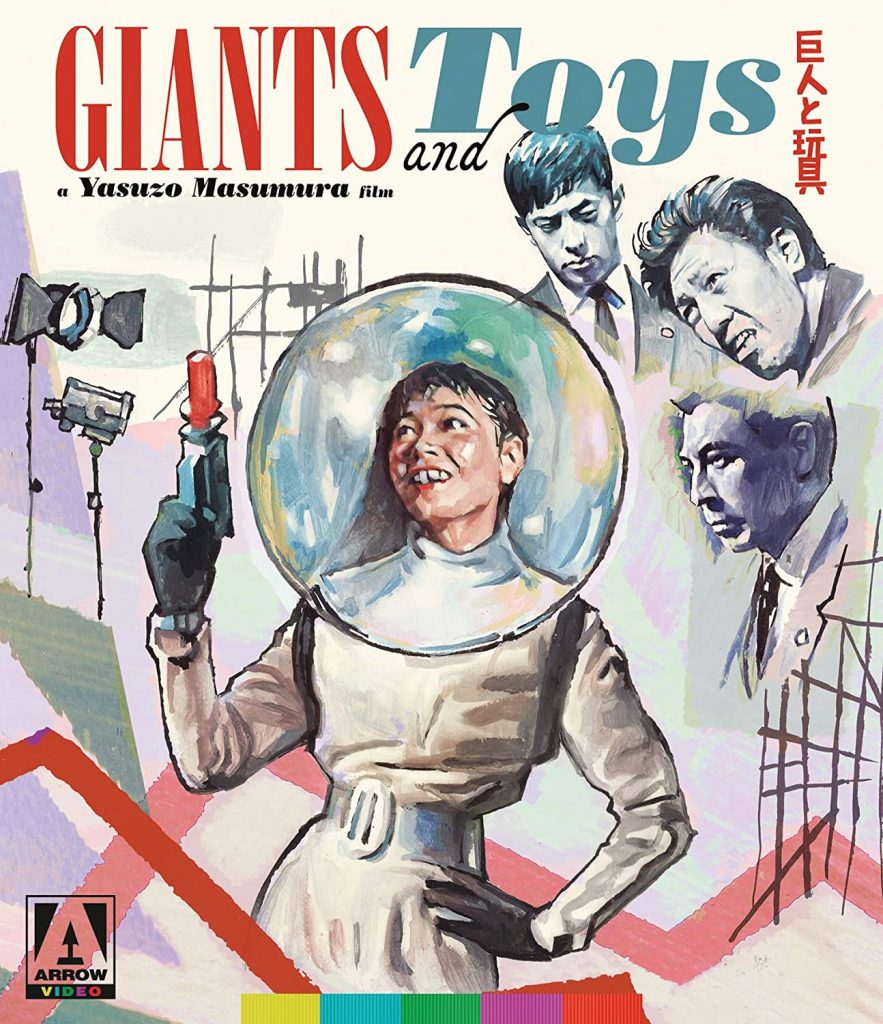
In the decades after a film is released, it isn’t unusual to see it begin to show its age. This doesn’t necessarily make the feature bad, but it does transform a movie from a contemporary piece of art into a fascinating look back to the ideas and experiences of a particular era. It’s rare that a movie actually becomes more accurate and relatable as time passes, but such is the case with Giants and Toys. This is a sharp and cutting Japanese satire that has just made its worldwide debut from Arrow Video as a Special Edition Blu-ray While it was clearly produced some time ago, the themes and ideas still feel current and relatable.
Set in the advertising world, the story follows Yôsuke Nishi (Hiroshi Kawaguchi), a recent university grad. He arrives to make his start in the publicity department of World Confectionary, a caramel and chocolate brand whose popularity has been waning. In fact, their sales are lagging well behind competitors Giant and Apollo. Nishi’s cutthroat and career-minded boss Ryuji Goda (Hideo Takamatsu) is determined to increase sales any way they can. While out on the town, they catch sight of an 18-year-old with bad teeth named Kyoko Shima (Hitomi Nozoe) and Goda decides that her unusual attributes will make her a perfect spokesperson for their products. He and Nishi set out to make her into a celebrity and incorporate the youth into a new publicity campaign that will make World the best-selling caramel brand. Initially, the pair are successful, but problems soon arise for everyone after Shima becomes an egotistical star and Nishi becomes aware of backstabbing practices and morally corrupt nature of his profession.
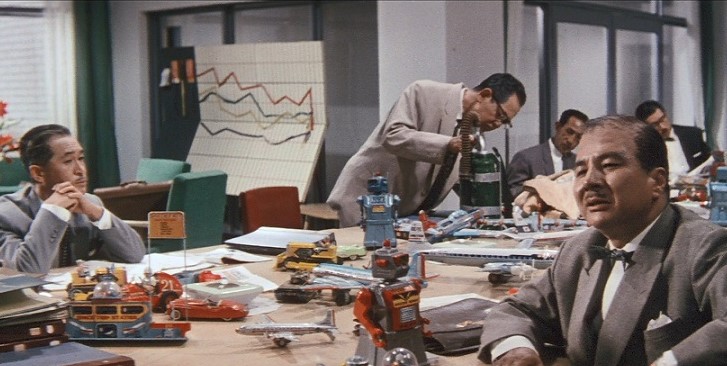
The film moves at a rapid pace as it details the fast-paced world of advertising, particularly in creating campaigns and personalities seemingly out of thin air. We see the entire process as they slowly turn Shima into a media sensation. There are also some interesting subplots as the naïve Nishi connects with friends old and new working at Giant and Apollo. They all offer advice and details, but it is immediately clear that they are either manipulating him (one character offers an idea for a new potential campaign, only for Nishi to learn that it is already in the works at his own office). The filmmakers make it evident that Nishi may too honest to survive in the corporate world.
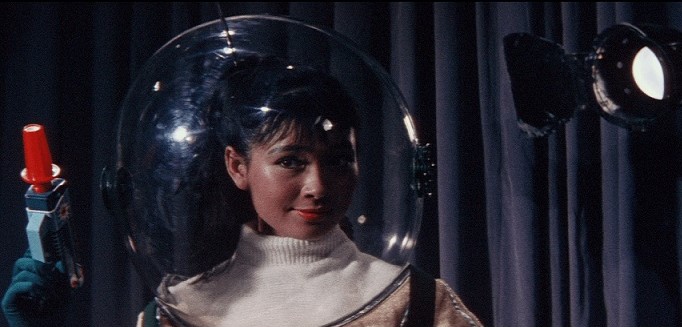
And on an even deeper level, the movie comes down effectively on consumerism as a whole. This tale is set in post-war Japan with the country was adopting more capitalistic tendencies from the US. The movie deals with the problems associated with the system, as well as how cutthroat, brutal and selfish it can be. The more we learn about the career-minded Goda, the less appealing he becomes. It is revealed that much of his success has come from marrying the boss’s daughter (whom he treats with disdain), a choice he made with the sole intention of moving up the corporate ladder. Viewers also see the nasty effect that fame has on Shima, perhaps most effectively rendered by her pet tadpoles. They slowly begin to die from lack of feeding as she becomes busier and more consumed by fame.
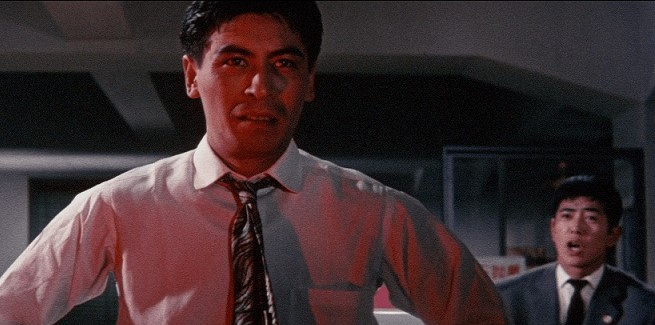
As the big campaign manifests itself, the participants discuss manipulation through media and altering the public’s thoughts and interests based on what is being presenting to them. We also learn how short-lived the careers are of some of the onscreen personalities. The story takes us briefly to a TV studio, where a director details the desperation of one star who used to be the famous face of another promotion. The stress of the situation also physically manifests itself on the publicity heads, with several characters suffering from ulcers. And as Nishi is asked to participate in more and more reproachable actions for the benefit of those in higher positions, the tension between himself and Goda really boils over. In between all of the amusing and elaborate stunts that the publicists use to garner press and win the caramel war, there’s an endless amount of fascinating commentary to unpack.
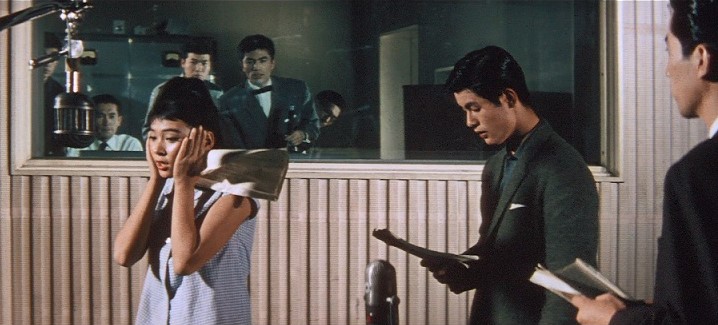
Visually, movie has an exaggerated and colorful look to it (at least, as far as the advertising signs and ad campaigns go), but the office interiors feel very claustrophobic and tightly packed with people and products. Even though this feature is over 60 years old and wouldn’t initially appear to have high stakes for the characters, things certainly get grimmer as the story progresses. The fast-talking characters and relentless pace of the caramel and chocolate campaigns ultimately keep things engaging from beginning to end.
While the feature was made well before the days of social media, this is still a story that is every bit as timely as it was during its original release. It’s fantastic to see it get proper treatment on Blu-ray. Admittedly, the image quality isn’t as sharp as some of the distributor’s other releases, the movie is bright and sharp, looking better here than it ever has before. There are also some great extras that are well worth checking out. The first is a detailed commentary from Japanese film scholar Irene González-López. She gives plenty of details about the ideas and issues being addressed in the movie, as well as filling in background information on the noted filmmaker Yasuzô Masumura , who directed the picture. She goes over the themes presented in this title and over his career in general, even delivering recommendations for other films in his catalog.
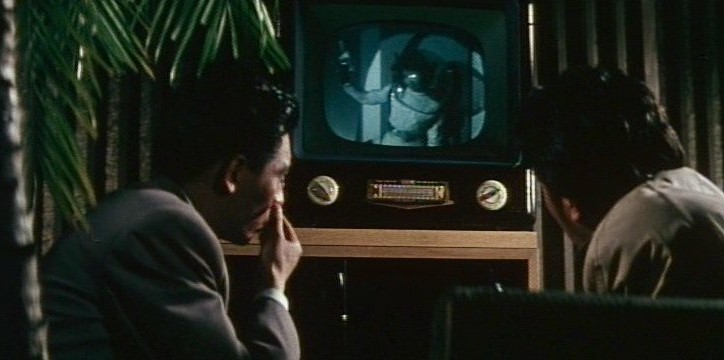
It also comes with a newly filmed introduction by another Japan movie expert Tony Rayns who also imparts information about the director, including the fact this movie was from an incredibly prolific period in his career. He explains his take on Masumura’s innovative way of showing the amoral and cruel nature of big business, contrasting it against a superficially colorful backdrop of candy production. A visual essay also offers analysis on the picture. All three participants featured in the extras have varied takes on specific elements and it’s fun to hear a variety of interpretations on the material. One critic sees the film’s final moments as a positive step, while another focus on the negative implications of what has occurred. They are all engaging and enlightening tracks to listen to. Additionally, a trailer is included and a lengthy still gallery of images from the feature.
In the end, Giants and Toys is a great little movie that paints a vision of the future that, for better or for worse, has now come to exist. Both the movie and the Blu-ray are highly recommended and those who enjoy Japanese cinema or dark satire are well-advised to pick up this little-known but important little gem.


